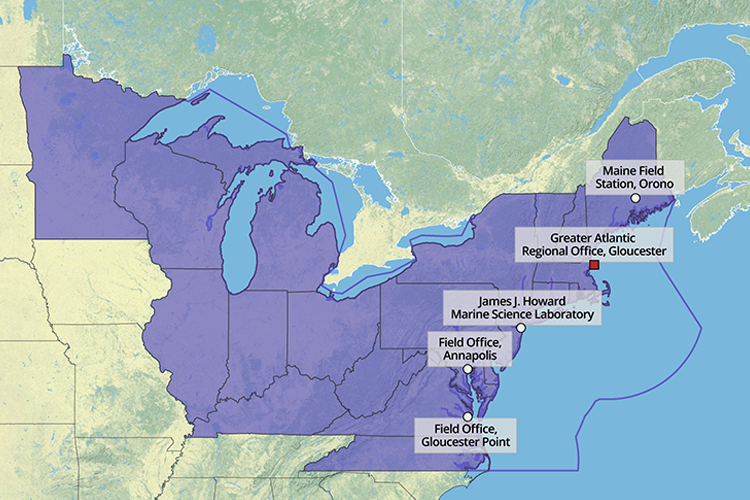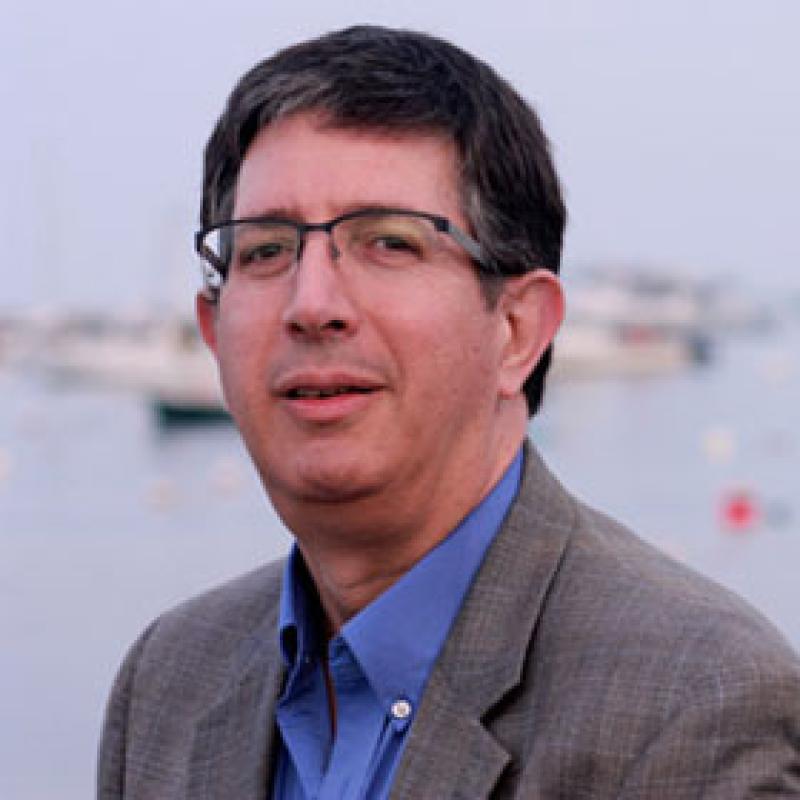Our Location

The Greater Atlantic Region encompasses approximately 100,000 square miles of the Northwest Atlantic. The region encompasses the temperate, structurally complex large marine ecosystem from Maine to Cape Hatteras, North Carolina; the Great Lakes; and the rivers and estuaries within this range. Directed from the Regional Office in Gloucester, Massachusetts, we also have four field offices in the Greater Atlantic region: Orono, Maine; Sandy Hook, New Jersey; Annapolis, Maryland; and Gloucester Point, Virginia. In addition, we have port agents and other industry liaison staff in Sedgewick, Maine; Portland, Maine; Gloucester, Massachusetts; New Bedford, Massachusetts; Point Judith, Rhode Island; Saunderstown, Rhode Island; East Hampton, New York; Toms River, New Jersey; Northfield, New Jersey; Belle Haven, Virginia; and Hampton, Virginia.
What We Do
Mission: Stewardship of living marine and diadromous resources through science-based conservation and management.
Vision: A future in which the American people continue to benefit from a healthy ocean and coastal ecosystems in the Greater Atlantic Region.
Situated in Gloucester, Massachusetts, the nation’s oldest fishing port, the Greater Atlantic Regional Fisheries Office works hand in hand with partner agencies, the fishing industry, international partners, non-governmental organizations, tribal nations, and members of the public to achieve our goals of sustainable use of living marine resources, conservation of the habitats upon which these resources depend, and the protection of endangered and threatened species that spend all or part of their lives in the ocean, and marine mammals.
We work closely with our NOAA Fisheries counterpart, the Northeast Fisheries Science Center, to make informed management decisions based on sound science.
Promote and Preserve Sustainable Fisheries
We work to maintain healthy fish stocks important to commercial and recreational fisheries with the goal to increase long-term economic and social benefits to our region. We work to improve fishing community resilience by focusing our delivery of information and resources to help communities reduce their vulnerability and improve their adaptability to climate change and other impacts.
- We work with two regional fishery management councils (New England and Mid-Atlantic), as well as with coastal states through the Atlantic States Marine Fisheries Commission to conserve and manage marine fisheries in federal waters from Maine through Virginia.
- With our partners, we manage more than 42 fish stocks and 14 fishery management plans, with New England landings revenue totaling $1.2 billion and Mid-Atlantic landings revenue totaling $512 million in 2015.
- We also manage recreational fisheries. Recreational fishing contributes $4.3 billion to our regional economy each year ($1.7 billion across New England and $3.5 billion across the mid-Atlantic in 2015). For-hire vessels, private vessels, and shore-based anglers harvest more than 75 million pounds of fish.
Protect Marine Wildlife
We protect marine animals listed under the Marine Mammal Protection Act and Endangered Species Act, and work to ensure their survival for future generations. This work is divided into three programs:
- Marine Mammal and Sea Turtle Program: We protect whales, dolphins, porpoises, seals, and five species of sea turtles from harm caused by human activities, carrying out the mandates of both the Marine Mammal Protection Act and the Endangered Species Act, including current work on the Atlantic Large Whale Take Reduction Plan.
- Endangered Species Consultations: We evaluate the effects of actions proposed by other federal agencies on endangered species, pursuant to Section 7 of the Endangered Species Act
- Endangered Species Act Listed Fish and the ecosystems on which they depend: We work with local and regional partners to develop and implement recovery plans for endangered Atlantic salmon, Atlantic sturgeon, and shortnose sturgeon, and to promote conservation of the habitat that will support these species' recovery.
Protect and Restore Important Fish Habitat
We are working to protect, restore, and promote stewardship of marine, estuarine, and riverine habitat to support our nation’s fisheries for future generations. We focus on three principal activities:
- Identification and conservation of Essential Fish Habitat for each fish species managed in our region, and incorporating steps to minimize habitat impacts in fisheries management plans.
- Consultation with federal agencies on proposed projects that may adversely impact EFH and other living marine resources, and recommending steps for mitigations of impacts.
- Restoration of habitat through: removing dams and other barrier in rivers that are important spawning and nursery grounds, installing living shorelines to reduce erosion and provide habitat, and restoring salt marsh beds to improve tidal flow in coastal wetlands.
More Information
Our Leadership

Michael Pentony
Regional Administrator
Mike stepped into the position of Regional Administrator on January 22, 2018. Mike has been with the agency since 2002, and served as Assistant Regional Administrator for the Sustainable Fisheries Division since 2014. Prior to joining NOAA Fisheries, he worked at the New England Fisheries Management Council. Mike has a B.S. in engineering and an M.S in environmental management from Duke University. He spent 6 years in the U.S. Air Force between earning his college and graduate degrees.

Sarah Bland
Deputy Regional Administrator
Sarah began her career with NOAA Fisheries in 2009 and has worked on a variety of issues, including Mid-Atlantic and recreational fisheries issues, cooperative research, and groundfish. Sarah stepped into the role of Deputy Regional Administrator in December 2022.
Management Team
Habitat and Ecosystem Services Division
Lou Chiarella
Assistant Regional Administrator for Habitat and Ecosystem Services Division-
-
Mid-Atlantic Habitat Conservation Branch
Karen Greene, Mid-Atlantic Branch Chief and EFH Regional Coordinator
-
Mid-Atlantic Habitat Conservation Branch
-
-
New England Habitat Conservation Branch
Chris Boelke, Chief, New England Branch and Greater Atlantic Region Hydropower Coordinator
-
New England Habitat Conservation Branch
-
-
Ecosystem Management Branch
Peter Burns, Ecosystem Services Branch Chief
-
Ecosystem Management Branch
Analysis and Program Support Division
David Gouveia
Assistant Regional Administrator for Analysis and Program Support-
-
Permits and Limited Access Programs Branch
Ted Hawes, Permits and Limited Access Programs Branch Chief
-
Permits and Limited Access Programs Branch
-
-
Monitoring and Analysis Branch
J. Michael Lanning, Monitoring and Analysis Branch Chief
-
Monitoring and Analysis Branch
-
-
Data Processing and Quality Branch
Barry Clifford, Data Processing and Quality Branch Chief
-
Data Processing and Quality Branch
-
-
Port Programs Branch
Luis Frazão da Silva Leandro, Port Programs Branch Chief
-
Port Programs Branch
Protected Resources Division
Jennifer Anderson
Assistant Regional Administrator for Protected Resources-
-
Marine Mammal and Sea Turtle Branch
Colleen Coogan, Marine Mammal & Sea Turtle Branch Chief
-
Marine Mammal and Sea Turtle Branch
-
-
ESA Fish, Ecosystems and Energy Branch
Julie Crocker, ESA Fish, Ecosystems and Energy Branch Chief
-
ESA Fish, Ecosystems and Energy Branch
-
-
Protected Species Conservation Branch
Jean Higgins, Protected Species Conservation Branch Chief
-
Protected Species Conservation Branch
-
-
ESA Section 7 Consultation Branch
Chris Vaccaro, ESA Section 7 Branch Chief
-
ESA Section 7 Consultation Branch
Sustainable Fisheries Division
Moira Kelly
Assistant Regional Administrator-
-
Groundfish Branch
Peter Christopher, Groundfish Branch Chief
-
Groundfish Branch
-
-
Scallop, Herring, Mackerel, Squid, Butterfish, and Small-Mesh Multispecies Branch
Emily Gilbert, Scallop, Herring, Mackerel, Squid, Butterfish, and Small-Mesh Multispecies Branch Chief
-
Scallop, Herring, Mackerel, Squid, Butterfish, and Small-Mesh Multispecies Branch
-
-
Atlantic States Commission, Mid-Atlantic Council and Ecosystems Branch
Jerome Hermsen, Atlantic States Commission, Mid-Atlantic Council and Ecosystems Branch Chief
-
Atlantic States Commission, Mid-Atlantic Council and Ecosystems Branch
Technology and Data Management Division
Peter Couture
Assistant Regional Administrator for Technology and Data Management-
-
Software and Database Development Branch
Torey Adler, Software and Database and Development Branch Chief
-
Software and Database Development Branch
Operations and Management Division
Shannon Dionne
Assistant Regional Administrator-
-
Grants, Facilities, and FOIA Branch
Cheryl Corbett, Branch Chief, Grants, Facilities, and FOIA
-
Grants, Facilities, and FOIA Branch
Communications & Internal Affairs
Our History
On the north shore of Massachusetts sits the oldest fishing port in the United States: Gloucester. Settled in 1623, fishing, art, and granite have been Gloucester’s mainstays. Gloucester is home to America’s oldest continuously operating seafood company, Gorton’s. Clarence Birdseye invented frozen foods in Gloucester while Winslow Homer was painting his schooners.
Gloucester demonstrates dedication to its fishing culture through numerous social events, cultural memorial structures, and organizations including the annual St. Peter’s Fiesta which began in 1927, the Gloucester Schooner Festival, and the annual Fishermen’s Memorial Service, an annual tradition to honor fishermen lost at sea. The earliest recording of this ceremony was in the mid-1800s.
Take your own journey and explore the history of Gloucester through this interactive story map.
Gloucester is celebrating its 400+ anniversary in 2023.
